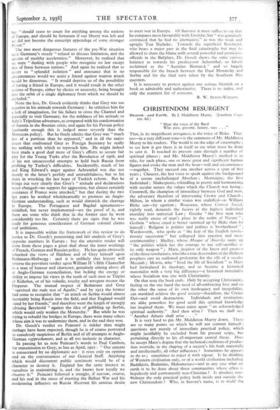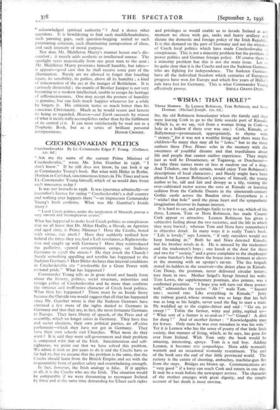CHRISTENDOM RESURGENT
" Hear the voice of the Bard Who past, present, future, sees . . ."
That, in its magnificent arrogance, is the voice of Blake. That too—in a very different tone—is the summons of Mr. Middleton Murry to his readers. The world is on the edge of catastrophe ; to see how it got there is in itself to see what must be done to save it. It reached its present state through a number of spiritual phases ; and Mr. Middleton Murry's method is to take, for each phase, one or more great and significant human figures and evoke the man and the hour—will and circumstance —together. They succeed one another across a span of boo years ; Chaucer, the last voice to speak against the background of a serene unchallenged Absolute ; Montaigne, the first Individual ; Shakespeare, rekindling in poetry and harmonising with secular nature the values which the Church was losing ; Cromwell, the champion of immediacy between God and man, the adversary therefore of intervening Crown and Church ; Milton, in whom a similar vision was stultified—as William Blake saw—by egotism ; Rousseau, whose Contrat Social, rightly read, demands the fusion of the highest individual morality into universal Law ; Goethe " the first man who was really aware of man's place in the realm of Nature " ; Godwin " whose creed is better summed up by Blake than by himself : Religion is politics and politics is brotherhood " ; Wordsworth, who spoke as " the heir of the English revolu- tionary succession " but collapsed into reaction and mere sentimentality ; Shelley, whose Masque of Anarchy sums up " the politics which has the courage to use self-sacrifice as its only weapon " ; Marx, inspirer of the latest and greatest of the three revolutions, who like a true descendant of the Hebrew prophets cast an outlawed proletariat for the role of a secular• Messiah ; Morris, who " lived the life of Socialism " as Marx had formulated its theology, and so became a historical materialist with a very big difference—a historical materialist whose Socialism was one with Christianity.
On that note the book ends. Only by accepting Christianity, feeling on the one hand the need of all-embracing love and on the other the sense of its own inadequacy and incapability, can mankind achieve the good society—Socialism, the Civitas Dei—and avoid destruction. Individuals and institutions are alike powerless for good until this spiritual knowledge has inspired them. We must enjoy again " an acknowledged spiritual authority." And then what ? Then we shall see. " Another Athens shall arise . . . "
It is very hard to pin Mr. Middleton Murry down. There are so many points on which he will not commit himself ; questions not merely of immediate practical policy, which might justifiably be excluded from his present scope, but pertaining directly to his all-important central thesis. Does he accept Marx's dogma that the technical conditions of produc- tion override, in the shaping of a society's life both materially and intellectually, all other influences ? Sometimes he appears to do so ; sometimes to reject it with vigour. Is he thinking of Western civilisation only, or of a world civilisation including Buddhists, Brahmins, Mahometans—and in any case what on earth is to be done about those communities whose ethos is hopelessly and permanently non-Christian ? Is absolute non- violence the only practical policy both inside and outside the new Christendom ? Who, in heaven's name, is to wield the " acknowledged spiritual authority " ? And a dozen other questions. It is bewildering to find such muddleheadedness, such yawning gaps, such question-begging united to such penetrating criticism, such illuminating juxtaposition of ideas, and such intensity of moral purpose.
Nor does Mr. Middleton Murry's manner lessen one's dis- comfort ; it merely adds aesthetic to intellectual unease. The spotlight veers majestically from one great man to the next ; Mr. Middleton Murry prostrates himself humbly, but takes— it appears—good care that he shall receive some part of the illumination. Rarely are we allowed to forget that kneeling figure, its sensibility, its pathos, above all its humility ; a kind of reincarnation of the ass at the manger of Bethlehem. It is curiously distasteful ; the mantle of Brother Juniper is not very becoming to a modern intellectual, unable to escape his heritage of selfconsciousness. One may accept the posture of humility as genuine, but one feels much happier whenever for a while he forgets it. His criticism tastes so much better than his conscious Christianity. Much as he would resent and lament its being so regarded, Heaven—and Earth succeeds by reason of what it incidentally accomplishes rather than by the fulfilment of its central aim. It can most satisfactorily be read not as a Prophetic Book, but as a series of brilliant personal







































 Previous page
Previous page